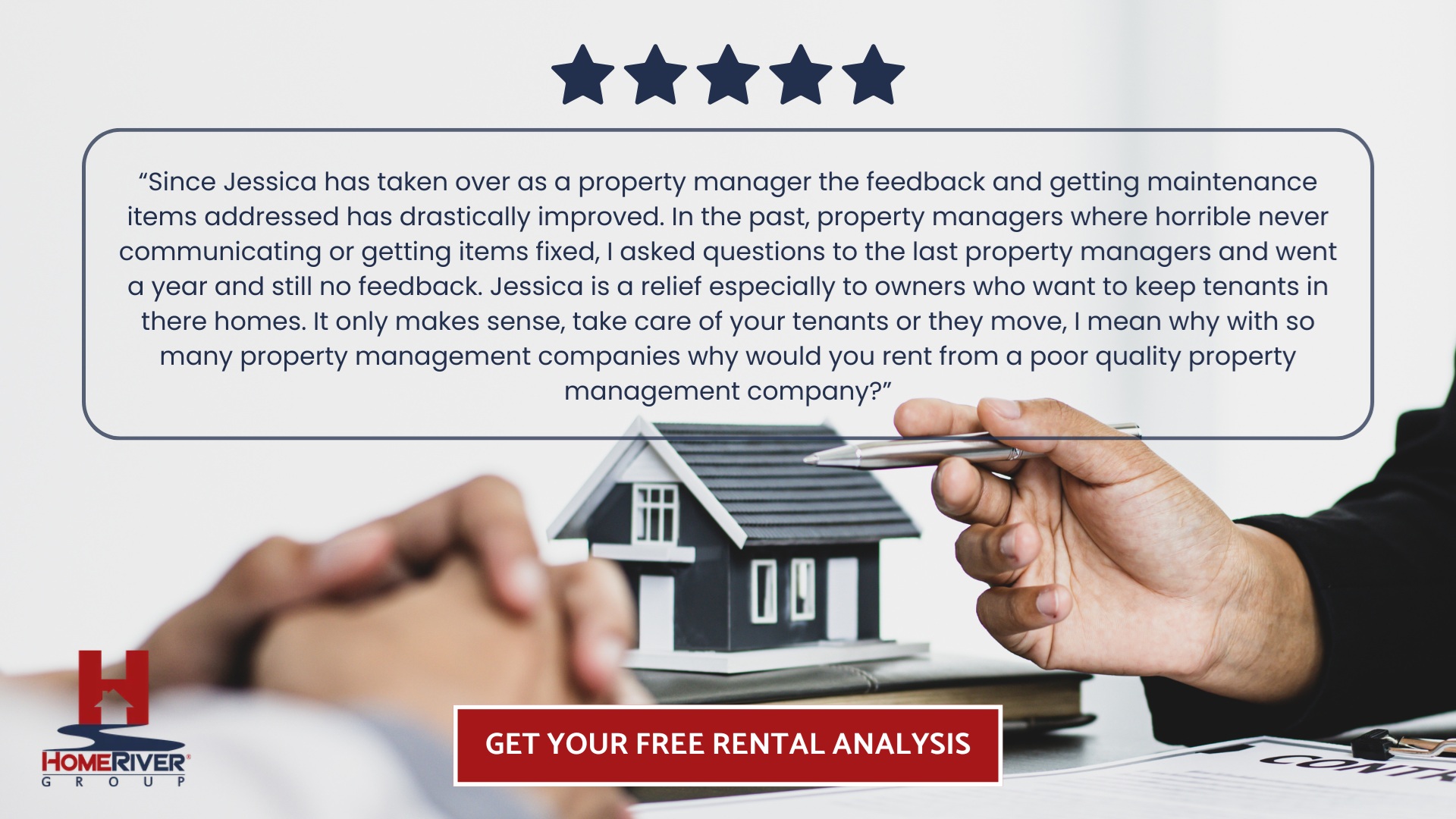
Property Management Accounting: Best Practices For Financial Success
At HomeRiver Group, we understand the pivotal role that efficient property management accounting plays in the thriving real estate sector. We focus on exceptional service combined with local expertise and are dedicated to ensuring your property flourishes financially. Our unique blend of dedicated local market expertise and a unified national platform positions us to offer unparalleled property management accounting services.
The backbone of any successful property management operation lies in its ability to handle accounting practices efficiently. Property management accounting strategically manages finances to ensure long-term success and stability for property owners, investors, and stakeholders. From accurate reporting to meticulous expense tracking, the nuances of property management accounting are complex yet essential.
This article outlines best practices in property management accounting, designed to guide stakeholders toward financial success in a competitive environment.
The Importance Of Accurate Financial Tracking
The accuracy of financial records cannot be overstated in property management. This fundamental aspect of property management accounting is pivotal for several reasons, each contributing to property investments' overarching financial health and success.
Here’s why meticulous financial tracking is indispensable:
Ensuring Compliance And Minimizing Risks
Property management companies must navigate a labyrinth of regulations, ranging from local to federal tax requirements. Accurate financial tracking enables companies to comply with these regulations effectively, minimizing legal and financial risks. Regular and detailed recording of financial transactions ensures that all revenue and expenses are accurately reported, which is essential for tax reporting purposes. Avoiding compliance issues is not just about dodging penalties; it's about maintaining a reputable standing that is critical for the business's long-term success.
Enhancing Decision Making
For property management companies like HomeRiver Group, which prides itself on offering a combination of local market expertise with comprehensive operations and reporting capabilities, accurate financial tracking is the bedrock of strategic decision-making. Insights drawn from financial data enable property managers to make informed decisions about property maintenance, marketing strategies, rental pricing, and investments in property improvements. These decisions directly impact the profitability of properties under management and the satisfaction of renters and buyers—our primary audience.
Optimizing Cash Flow
Maintaining a positive cash flow is vital for the sustainability of any property management operation. Accurate and timely tracking of all financial transactions, including income from rents, service fees, and expenses such as maintenance and staff salaries, provides a clear view of the company’s financial health. It assists in forecasting cash flow needs and making necessary adjustments to spending or operational strategies to ensure financial stability. Effective cash flow management ensures that a property management company can meet its financial obligations on time, which is essential for maintaining strong relationships with vendors, service providers, and clients.
Setting Up A Robust Property Management Accounting System
A robust property management accounting system is the backbone of financial success for property managers. With the right system in place, you can efficiently track income, expenses, and the overall financial health of your property portfolio.
Here are the steps to setting up a system that aligns with best practices in property management accounting:
Select software tailored to property management needs, such as features for tracking rent payments, maintenance expenses, and owner distributions. Opt for a platform that integrates with other tools you use, from payment gateways to tenant screening services, to streamline operations.
A well-organized chart of accounts ensures you can categorize transactions consistently and accurately. This should include categories specific to property management, such as rental income, repair and maintenance expenses, and management fees. This foundation is critical for effective financial analysis and reporting.
Set up a separate bank account for each property you manage. This simplifies tracking income and expenses per property and ensures accuracy in financial reporting. It also helps maintain financial integrity by preventing the mixing of funds between properties.
Consistency in financial reporting is key. Decide on regular monthly, quarterly, or yearly intervals for generating financial reports, including balance sheets, income statements, and cash flow statements. Regular reporting helps make informed strategic decisions and spot trends or issues early.
Stay informed about local, state, and federal rental property regulations, including tax and landlord laws. Implement practices to ensure all financial activities comply with these regulations, from proper tenant screening and lease agreements to tax deductions and filings.
Leverage technology to automate repetitive tasks regarding rental property accounting records and management. Automated rent collection, invoice payments, and late fee calculations can save time and reduce errors. Choose property management accounting software with automation features aligned with your operational needs.
Ensure that everyone involved in the property management process, from your team to property owners, understands how to use the accounting system effectively. This includes training on entering transactions, generating reports, and interpreting financial data.
Implementing Regular Financial Audits
For property management accounting, a key to achieving and maintaining financial success lies in the vigilant oversight of financial practices and records. These audits serve as an accountability mechanism and a strategic tool to identify areas for financial optimization.
Why Regular Financial Audits Matter
For property managers and owners alike, the primary goal is to ensure that properties under management are financially viable and generate expected returns on investment. Regular financial audits provide a clear, unbiased snapshot of your property's financial health, uncovering potential issues before they escalate into significant problems.
They help in:
Detecting discrepancies and anomalies in financial records that could indicate errors or even fraudulent activity.
Verifying financial information accuracy ensures that all financial transactions are recorded and reported correctly.
Assessing the effectiveness of existing financial controls and identifying areas that need improvement.
Enhancing stakeholders' confidence by demonstrating a commitment to transparency and fiscal responsibility.
Best Practices For Effective Financial Audits
At HomeRiver Group, we adhere to best practices designed to make financial audits effective and efficient.
These include:
Scheduling Regular Audits: Establish a regular schedule for financial audits, ideally quarterly or semi-annually. This helps prevent potential issues and keep financial records up to date.
Engaging External Auditors: While internal audits are beneficial, the engagement of external auditors brings an additional layer of objectivity and expertise. External auditors can often identify issues that may not be apparent to internal teams.
Comprehensive Review: Ensure that the audit covers all aspects of property management accounting, from income and expense records to bank statements and tenant deposits.
Follow-Up & Action: Crucially, the findings of financial audits should not be ignored. Implementing the recommendations and rectifying identified issues is essential for enhancing financial practices and controls.
Handling Maintenance And Capital Improvements Financially
Effective property management accounting involves navigating the intricacies of maintenance and capital improvements with financial savvy. When managing properties, it's essential to distinguish between these two types of expenditures due to their differing impacts on your financial statements and tax implications. We emphasize smart strategies to ensure that renters and buyers benefit from our expertise in handling these aspects.
Tracking And Budgeting for Maintenance
Routine maintenance is integral to keeping a property in top condition and ensuring tenant satisfaction. It includes repairs, servicing of equipment, and minor improvements.
Here's how we manage these expenses financially:
Regular Maintenance Reserve: We recommend setting aside a portion of the monthly rental income in a maintenance reserve. This fund acts as a financial buffer, ensuring that resources are always available for necessary repairs without negatively impacting the operational cash flow.
Preventative Maintenance Scheduling: Implementing a schedule for regular checks and maintenance activities can prevent major repairs and expenses in the long run. This approach helps maintain a predictable budget and reduces unexpected financial strains.
Cost Tracking and Analysis: We meticulously track all maintenance expenses using property management accounting software. This enables us to analyze trends over time, identify areas for cost reduction, and make informed budgeting decisions for future maintenance work.
Capital Improvements And Investment Strategies
Unlike routine maintenance, capital improvements enhance the property's value, extend its life, or adapt it for new uses. These can range from major renovations to adding new facilities.
Financial handling of these investments requires a strategic approach:
Capital Expenditure Planning: We thoroughly plan before committing to any capital improvements. This includes assessing the potential increase in property value, the impact on rental income, and the return on investment (ROI). Detailed planning ensures that the capital expenditure aligns with long-term financial goals.
Funding and Financing Options: Exploring various funding options is crucial for capital improvements. At HomeRiver Group, we leverage our national platform and local market expertise to secure the most favorable financing terms, considering both internal reserves and external financing opportunities.
Tax Considerations and Depreciation: Capital improvements have tax implications that are different from routine maintenance. We work with tax professionals to optimize the tax benefits associated with capital improvements, including leveraging depreciation, which can significantly impact the property's net income and tax liability.
Strategies For Managing Cash Flow Effectively
Cash flow management is critical to property management accounting, ensuring financial health and operational longevity. Effective cash flow management strategies help property management companies, like HomeRiver Group, maintain a steady flow of income and control expenses, thus maximizing profitability.
Here are some best practices for managing cash flow effectively in the property management sector:
Prioritize Timely Rent Collection
Timely rent collection is the cornerstone of positive cash flow. Implementing automated payment systems can reduce late payments and streamline the collection process. Offering multiple payment options can also make it easier for tenants to pay on time, ensuring a consistent income stream.
Maintain A Comprehensive Budget
A well-planned budget is essential for tracking income and expenses, helping identify potential cash flow problems before they arise. Include all possible revenues and expenditures, from maintenance costs and property taxes to utilities and emergency funds. Regular budget reviews allow adjustments in response to financial performance and market conditions, ensuring the budget remains useful for cash flow management.
Build A Strong Reserve Fund
Unexpected expenses are inevitable in property management. A strong reserve fund can cover unforeseen costs without straining the operational budget. This fund acts as a financial buffer, ensuring that properties are well-maintained and that cash flow remains stable, even in times of crisis. Aim to set aside a portion of the monthly rental income to strengthen this reserve progressively.
Optimize Operational Efficiency
Streamlining operations can significantly reduce costs and enhance cash flow. HomeRiver Group optimizes efficiency across all property management activities. From leveraging bulk purchasing for maintenance supplies to implementing energy-efficient practices, optimizing operational efficiency can lead to substantial savings.
Regular Financial Analysis And Reporting
Consistent financial analysis and reporting are vital for monitoring cash flow and making informed decisions. Analyzing monthly financial reports helps identify trends, track the effectiveness of cash flow management strategies, and adjust policies as needed. HomeRiver Group's capabilities facilitate comprehensive and accurate financial reporting, providing a clear view of financial health.
Final Thoughts
Mastering property management accounting is critical to achieving financial success and ensuring the longevity and prosperity of your real estate investments. By adhering to the best practices outlined, including timely and accurate financial reporting, leveraging technology for efficiency, and understanding the unique financial nuances of property management, you can take your financial strategy to new heights.
HomeRiver Group stands at the forefront of integrating these best practices into our expansive portfolio of property management services. Our multi-state footprint and national platform offer an unparalleled blend of local market expertise and centralized financial management. This unique approach ensures that every property under our care reflects our commitment to exceptional service and the financial acumen necessary for success in today's market.
Choose wisely, and consider partnering with a management company that views your property's financial health as paramount—just as we do at HomeRiver Group.
Read also:
Frequently Asked Questions About Property Management Accounting
What is property management accounting?
Property management accounting focuses on tracking income and expenses, preparing financial statements, budgeting, and ensuring compliance with real estate laws. It is tailored to rental property management's unique financial needs.
How does proper accounting benefit property management?
Proper accounting ensures accurate financial tracking, tax compliance, and strategic decision-making. It helps maintain profitability, boosts investor confidence, and ensures tenant satisfaction.
How often should financial reports be prepared in property management?
Financial reports should be prepared monthly for up-to-date performance insights, with yearly reports for comprehensive overviews, tax purposes, and strategic planning.
What accounting software is recommended for property managers?
Recommended property management software includes QuickBooks, Yardi, and AppFolio. The best choice depends on the property's size and complexity.
How do you handle maintenance and repair accounting?
Record maintenance and repair costs as expenses, create a dedicated cost center and set aside a reserve fund for major repairs or capital expenditures to maintain cash flow.
What is the importance of budgeting in property management?
Budgeting provides a financial framework for operations, guides decision-making, and sets benchmarks, helping ensure profitability, financial stability, and preparedness for unexpected expenses.










